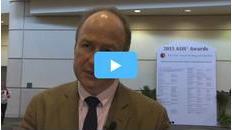Advertisment
ASH 2015: Ernest Beutler Lecture Prize: Award-winners trace history of proteasome and its starring role in MM treatment: Interview with Alfred Goldberg, PhD, Professor of Cell Biology at Harvard Medical School, and Paul Richardson, MD, Professor of Medicine at the Dana-Farber Cancer Center

by Thomas R. Collins: Standing at the center of a decade and a half of stunning advancements in the treatment of multiple myeloma is the ubiquitin proteasome pathway (UPP), the understanding of which paved the way for the class of proteasome-inhibitor drugs that has revolutionized MM treatment and literally given new life to patients, some of whom had previously tried and failed every other option.
The pathway — the systematic disposal of proteins in the body — and the new therapies that target it were given a special time in the spotlight at the 57th Annual Meeting of the American Society of Hematology, with the honoring of a scientist who discovered the ATP-dependent system of the UPP, and a clinician who has led a series of trials that, one by one, broke new ground in treatment with proteasome-inhibitors.
Alfred Goldberg, PhD, Professor of Cell Biology at Harvard Medical School, and Paul Richardson, MD, Professor of Medicine at the Dana-Farber Cancer Center, jointly received the Ernest Beutler Prize recognizing major translation advancements in haematology.
Society Vice President Ken Anderson, MD, Program Director of the Jerome Lipper Multiple Myeloma Center at Dana-Farber, hailed the progress.
“The most remarkable advances have come in the past 15 years, based upon targeting the myeloma cell in its bone-marrow microenvironment and best illustrated by the development of proteasome inhibitor therapy,” he said.
Development of the first proteasome-inhibitor, bortezomib, has been a springboard for 15 approvals, at least in the U.S., including 7 approvals in 2015 alone — for bortezomib itself, second-generation PI carfilzomib and ixazomib, and drugs in other classes.
Dr. Goldberg traced the history of the understanding of the proteasome and described how proteasome inhibitors block degradation of abnormal immunoglobulins, causing the accumulation of misfolded endoplasmic-reticulum proteins. That triggers the unfolded protein response, which leads to cancer cell death. The drugs also work by preventing activation of NF-kappa-beta protein complex that inhibits apoptosis.
Dr. Richardson — who has led trials on bortezomib and ixazomib and the monoclonal antibodies daratumumab and elotuzumab — called the last decade of MM drug development “quite remarkable in terms of its pace.”
“I think it’s extraordinary that bortezomib is now available in 108 countries,” Dr. Richardson said. “It’s estimated that 700,000 patients have been treated worldwide. And this has been built on a platform of very strong pre-clinical then clinical science.”
Second-generation carfilzomib has the advantage of being “minimally neurotoxic — particularly in combination this drug has been very promising.”
Ixazomib, part of the first-all oral proteasome-inhibitor regimen, “very importantly has rapid-on, rapid-off pharmacology that made it very attractive to minimize toxicity and expand efficacy,” he said.
And the list is likely to continue to grow, he said. Marizomib and oprozomib are two other PIs in development.
“Tailored approaches are now feasible to provide more specific, less toxic combination therapies with the backbone of proteasome inhibition as part of them,” Dr. Richardson said. “Obviously we have challenges, but nonetheless, there’s real hope for our patients with second-generation proteasome inhibitors either now established or coming…. These, I think, are very exciting times.”





